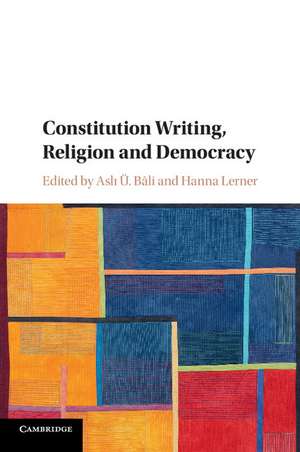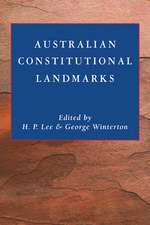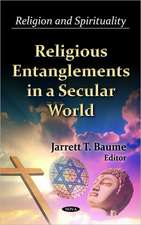Constitution Writing, Religion and Democracy
Editat de Aslı Ü. Bâli, Hanna Lerneren Limba Engleză Paperback – 20 iun 2018
| Toate formatele și edițiile | Preț | Express |
|---|---|---|
| Paperback (1) | 325.77 lei 43-57 zile | |
| Cambridge University Press – 20 iun 2018 | 325.77 lei 43-57 zile | |
| Hardback (1) | 840.03 lei 43-57 zile | |
| Cambridge University Press – feb 2017 | 840.03 lei 43-57 zile |
Preț: 325.77 lei
Nou
Puncte Express: 489
Preț estimativ în valută:
62.33€ • 65.26$ • 51.58£
62.33€ • 65.26$ • 51.58£
Carte tipărită la comandă
Livrare economică 07-21 aprilie
Preluare comenzi: 021 569.72.76
Specificații
ISBN-13: 9781107694545
ISBN-10: 110769454X
Pagini: 416
Dimensiuni: 152 x 230 x 24 mm
Greutate: 0.61 kg
Editura: Cambridge University Press
Colecția Cambridge University Press
Locul publicării:New York, United States
ISBN-10: 110769454X
Pagini: 416
Dimensiuni: 152 x 230 x 24 mm
Greutate: 0.61 kg
Editura: Cambridge University Press
Colecția Cambridge University Press
Locul publicării:New York, United States
Cuprins
Acknowledgments; Contributors; 1. Introduction Aslı Ü. Bâli and Hanna Lerner; Part I. Constitution Writing and Religion under Limited Sovereignty: 2. The curious case of religion in the Norwegian Constitution John Madeley; 3. Religion and the Japanese Constitution Helen Hardacre; 4. Constitution making and religion in West Germany in the shadow of state failure Tine Stein; Part II. Post-Colonial French-Influenced Constitution Writing and Religion: 5. Secularism in a sectarian society: the divisive drafting of the 1926 Lebanese Constitution Mark Farha; 6. The constitution of a 'laïc' African and Muslim country: Senegal Soulaymane Bachir Diagne; 7. Constitution writing and religious divisions in Turkey Ergun Özbudun; Part III. Post-Colonial South Asian Constitution Drafting and Religion: 8. Constitutionalism, Islamic law, and religious freedom in post-independent Indonesia Mirjam Künkler; 9. Cross-cutting rifts in constitutions and minority rights: India, Pakistan, Sri Lanka Shylashri Shankar; 10. Islamic law in an Islamic republic: what role for parliament? Matthew Nelson; Part IV. Constitution Writing and Religion in the Contemporary Middle East: 11. Constitutional impasse, democracy and religion in Israel Hanna Lerner; 12. Islam and constitutionalism in the Arab world: the puzzling course of Islamic inflation Nathan Brown; 13. The politics of sacred paralysis: Islam in recent Moroccan and North African constitutions David Mednicoff; 14. Dancing by the cliff: constitution writing in post-revolutionary Tunisia, 2011–2014 Nadia Marzouki; Part V. Lessons from the Cases: 15. Designing constitutions in religiously divided societies Aslı Ü. Bâli and Hanna Lerner.
Recenzii
'This book will be of great value to anyone with an interest in constitutional law, particularly its operation in relation to religion. While firmly rooted in the legal discipline, the studies and editorial commentary also incorporate helpful perspectives from political and social sciences. The often neglected contexts with which the work engages, coupled with the fusion of new insights, make this a welcome addition to the literature in this field, and also signal new pathways that future commentators can fruitfully forage for new perspectives and understanding.' Javier García Oliva, Journal of Church and State
Descriere
This book explores the challenge of crafting a democratic constitution under conditions of deep disagreement over a state's religious or secular identity.
















